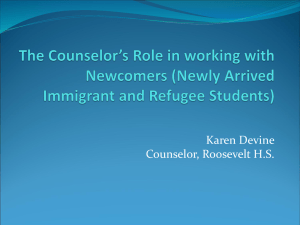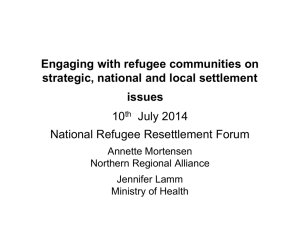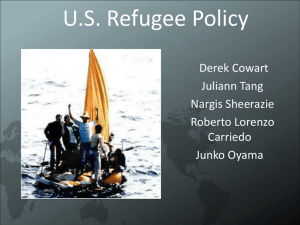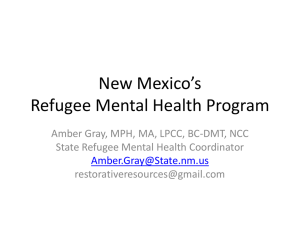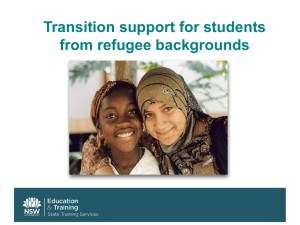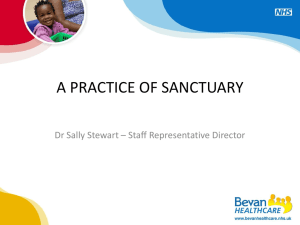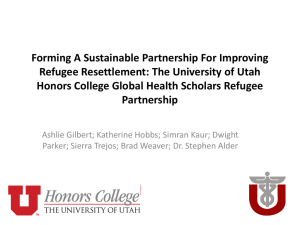Revised powerpoint for posting.
advertisement
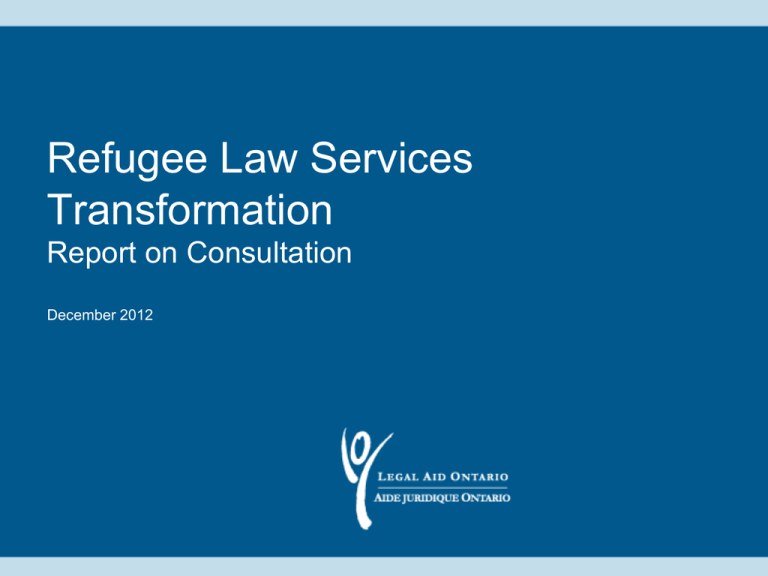
Refugee Law Services Transformation Report on Consultation December 2012 Refugee law services transformation objectives • Respond to legislative change, Protecting Canada’s Immigration System Act, December 15, 2012 • Modernize the delivery of refugee law services based on the continuum of service • Manage refugee law services within LAO’s budget • Ensure quality service for refugee claimants 2 Refugee Law Services Transformation Consultations • • • • • 3 LAO held 13 consultation sessions with the private bar, clinics, community agencies and legal associations from November 5 to December 10. LAO received written submissions from – The Refugee Lawyers Association – Parkdale Community Legal Services – Roma Community Centre – private bar members – clinic representatives Consultations were held in the following locations – Eight sessions in the GTA – Two in Ottawa – One in the Fort Erie – Two in Hamilton Over 114 registrants For details of feedback, see Appendix A. For list of participants, see Appendix B Refugee Law Services Transformation Consultation summary 4 Private bar • LAO should – Maintain or expand certificate coverage, including Refugee Appeal Division – Ensure the Basis of Claim as critical document is adequately funded – Improve quality of service – get rid of “bad apples” – Ensure legal aid access for all meritorious claims – Ensure continuity of service provider: BOC hearing – Challenge Bill C-31 – Lobby for increased funding – Co-ordinate services with clinics/RLO – Ensure coverage decisions based on individual merit assessment not IRB acceptance rates – Provide coverage (BOC prep & hearing representation) for 90% & 25% acceptance rate countries, including DCOs (“safe” countries) – Supervise paralegals if they are to provide refugee services 5 Refugee Law Services Transformation Clinics • LAO should – Be a champion for refugee rights, including the right to counsel for refugees – Provide funding for test case litigation, law reform efforts, and community mobilization to address systemic issues – Not tie funding for refugee law services to levels of targeted funding provided by the Federal government. – Ensure a well-functioning legal aid certificate program as the most effective and efficient service delivery model – Ensure that all refugee claimants whose cases meet a minimal merit threshold obtain legal representation. – Provide substantial new funding to legal clinics to respond to refugee service pressures based on proposed model 6 Refugee Law Services Transformation Community partners • LAO should – Develop plain language public legal information – Develop summary legal advice, and duty counsel services at ports-of-entry or CICs – Collaborate more with community agencies – Support agencies interested in holding legal clinics for claimants to explain LAO and IRB processes 7 Refugee Law Services Transformation Paralegals • LAO should – Provide opportunity for paralegals to serve refugee clients – Develop training and ‘articling’ rotations in support of refugee competency – Support efforts to increase refugee law learning opportunities at LSUC and colleges 8 Refugee Law Services Transformation Appendix A: Consultation – Details of stakeholder feedback 9 Stakeholder consultation feedback Concerns re: consultation paper – “The paper comes at a time when more, and not less, resourcing for refugees is needed. The federal government is busy creating a system that will make things harder for refugee claimants, and it would be a catastrophe for LAO to cut its funding at such a time. Yet the paper seems to be focused on cuts.” – “The paper throws out ideas like using immigration consultants, and allowing the Minister to dictate (based on the DCO “safe country” list) whether a claimant will be represented by a lawyer.” – “The paper is wrongheaded with its focus on decision-making based on the statistical grant rate that the IRB uses. It would be wrong for LAO to use those statistics, or the government’s own designation of safe countries, to decide who can have a lawyer.” 10 Refugee Law Services Transformation Stakeholder consultation feedback Concerns re: consultation paper – ‘Does nothing to push back against what the federal government is doing, and never acknowledges that the new system is a direct attack on refugees.’ – ‘Has come out at what is really the bleakest moment for refugees …. it would not be surprising if the bar becomes discouraged, particularly after LAO announced changes to refugee services in August, to be effective in early September, without prior consultation with the bar.’ – ‘Provides an opportunity for a genuine consultation process, but there is a perception out there, because of changes in September, that LAO has already made up its mind.’ 11 Refugee Law Services Transformation Stakeholder consultation feedback Summary legal advice (SLA) & Basis of Claim (BoC) services – “Consider a summary legal advice (SLA) hotline at port-ofentry sites” – “SLA and triaging must be performed by subject-matter experts” – “BoC form and front-end services are critical and should be funded adequately” – “It is problematic to merit-assess cases based on Refugee Protection Division acceptance rates” 12 Refugee Law Services Transformation Stakeholder consultation feedback Refugee Protection Division (RPD) service levels • “Representation at the Refugee Protection Division is imperative where there is a 90 per cent success rate – serious risk of harm on return to country of origin if claim fails” • “There should be representation for Designated Country of Origin “safe” claimants who have a reasonable chance of success as these cases will be contested” 13 Refugee Law Services Transformation Stakeholder consultation feedback Refugee Appeal Division (RAD) & federal court representation service levels • “Meritorious appeals (RAD) should be funded” • “A panel of staff specialists should be created to do RAD” • “There will be an increase in emergency federal court stay applications that should be funded” • “A specialized panel of lawyers should be created to assess and proceed with meritorious judicial review applications, without the requirement of area committee approval’ 14 Stakeholder consultation feedback Payment options – “Service contracts would create competition between lawyers, a barrier to participation by new lawyers, and sacrifice quality for cost savings” – “Block fees may work if service is adequately costed and funded” 15 Stakeholder consultation feedback Unbundling of refugee services • ‘Clients will not be well-served if there is a lack of continuity of service as a result of unbundling, i.e., the person funded to prepare the basis of claim should appear with the claimant at the hearing” • “There is a need for better communication and more plainlanguage instructions to clients about LAO processes” 16 Stakeholder consultation feedback Alternative service providers • “There is scope for paralegals, supervised by lawyers, to provide some refugee services” • “Paralegal training in college does not properly prepare paralegals to work in this area” • “The idea of immigration consultants providing these services is ill advised” • “Staff or per diem duty counsel could provide services at ports of entry or Canadian Immigration Centers (CICs)” 17 Stakeholder consultation feedback From clinics – “Clinics lack the experience and capacity to take on refugee law services, although some clinics do this work and are interested in continuing to do it, with sufficient resources” – “Clinics, private bar and RLO need to work closely with community service providers, particularly given the short timelines” – “The Refugee Law Office (RLO) provides a good service” – “The RLO could provide expanded services, for example through ‘mini-RLOs’ that could provide assistance at ports of entry” 18 Stakeholder consultation feedback From agencies • “Students and volunteer services can be used in provision of some refugee services” • “Summary legal advice and public information in plain language would be valuable” • “Web-based information and case-specific research would be valuable” 19 Refugee Law Services Transformation Stakeholder consultation feedback Quality services • “LAO should remove bad panel members from the panel – general sense that LAO is not doing enough in the area of panel management” • “LAO should more closely scrutinize applicants who have family members who might be able to pay for legal fees” • “LAO should undertake foundational work to establish the relative cost-effectiveness of different service delivery models” • “The current proposed model will have an impact on quality service and clients falling between the cracks” 20 Refugee Law Services Transformation Stakeholder consultation feedback Charter challenges – “LAO should be more proactive about funding test case litigation in the area of refugee law” – “LAO could fund clinic efforts to fight Bill C-31” 21 Refugee Law Services Transformation Appendix B: Consultation participants 22 Appendix B: Consultation participants LAO Board Refugee Law Advisory Committee Refugee Lawyers Association Ottawa Immigration Bar Hamilton Community Legal Clinic FCJ Hamilton House Canadian Centre for Victims of Torture St. Christopher House Sojourn House Amnesty International IHC Red Cross Faithful Companions of Jesus South Etobicoke Community Legal Clinic Fort Erie community partners LAO Area Committee Hiv & Aids Legal Clinic Ontario Romero House 23 Mississauga Community Legal Services Flemington Community Legal Services Neighbourhood Legal Services Woodgreen Quinte United Immigrant Services York Hispanic Centre Ontario Council of Agencies Serving Immigrants TRAC Metro Toronto Chinese & Southeast Asian Legal Clinic ACLCO Roma Community Centre Parkdale Community Legal Services Paralegal Association Paralegal Society Immigration Consultants of Canada Refugee Law Services Transformation
